News
Fonterra raises forecast Farmgate Milk Price
22 Nov 2016Fonterra has increased its 2016/17 forecast Farmgate Milk Price by 75 cents to NZ$6.00 per kgMS, making the forecast total payout available to farmers $6.50 to $6.60 before retentions.

Fonterra has increased its 2016/17 forecast Farmgate Milk Price by 75 cents to NZ$6.00 per kgMS.
When combined with the forecast earnings per share range for the 2017 financial year of 50 to 60 cents, the total payout available to farmers in the current season is forecast to be $6.50 to $6.60 before retentions.Chairman John Wilson said the increase reflects improvements in pricing since September, following the gradual rebalancing of global supply and demand.“We’ve seen falling production in the major exporting regions, particularly Europe and Australia, and an unprecedented decline in New Zealand milk supply due to wetter than normal spring conditions across most regions,” said Wilson. “On balance, demand continues to be firm. As a result there has been a steady improvement in global dairy commodity prices and this is reflected in the improved forecast.”“We are very mindful that farm incomes will be affected this year because of lower milk production so we will be doing everything possible to build on our good start to the financial year and deliver the highest possible total payout to our farmers.” Fonterra’s first quarter revenue of $3.8 billion is up 6% on the same period last year. Sales volumes are up two per cent to 4.9 billion litres liquid milk equivalent (LME), while the gross margin of 22% remains largely unchanged.Chief Executive Theo Spierings said the first quarter revenue gains reflected broad-based volume and margin growth across the business, and an ongoing focus on cost controls.“Our operating expenses have reduced by two per cent to $621 million and we continue to keep a close rein on them, in line with the financial discipline shown last year,” he said.The co-operative has moved an additional 128 million litres LME into higher-value consumer and foodservice products compared with the same period last year.“The consumer and foodservice business achieved an improved gross margin of 31%, up from 28 per cent,” said Spierings. “This reflects the increasing strength of our brands in key markets and our focus on chef-led solutions in foodservice.”Spierings said while the first quarter performance was pleasing, the co-operative’s earnings face emerging head-winds for the remainder of the financial year.“Our current milk collection forecast is 1,460 million kilograms of milk solids (kgMS), down seven per cent on last season, and this is constraining sales,” he said. “In addition there is a potential impact from the price of Milk Price reference products, such as whole milk powder, rising faster than non-reference products.”Spierings said that, given the co-operative’s stronger sales performance and lower production volumes, it continues to monitor its inventory and contracted sales position closely.Wilson said the co-operative has had a strong start to the year. “The unchanged earnings guidance range of 50 to 60 cents took into account the fact that a higher milk price had the potential to influence margins across the business,” he said. “However, we do expect this volatility to continue which could impact both milk price and earnings guidance. We will keep our farmers and investors updated as we move through the year.”Related news

Danone removes NutriScore from products
20 Sep 2024
Following an algorithm update that gives some of its sweetened drinks a worse score, Danone has removed the front-of-pack label, NutriScore, from all of its products – putting profit before public health, say campaigners.
Read more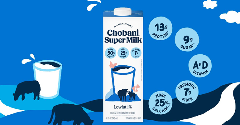
Chobani develops shelf-stable, prebiotic-enriched Super Milk
12 Sep 2024
Chobani has launched a prebiotic-enriched, shelf-stable, high-protein dairy milk to support people in disaster zones who need a nutritious drink that does not require refrigeration.
Read more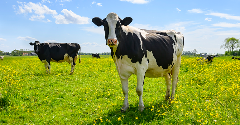
Tesco trials methane mitigation supplement for dairy cattle
5 Sep 2024
Tesco is trialing a methane-reducing feed supplement for one of its key UK dairy farms, sustainable UK milk producer Grosvenor Farms.
Read more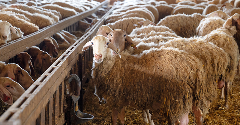
Sheep and goat plague: A new threat to Greece’s feta production
27 Aug 2024
A recent goat and sheep plague outbreak threatens feta production in Greece. The flagship product accounts for roughly 10% of the country’s food exports, but Greek authorities say there is no cause for concern.
Read more
Nestlé develops a new fat reduction method for dairy ingredients
26 Aug 2024
A Brazil-based Nestlé research and development team has developed a way to reduce the fat in milk powder by as much as 60%, without impacting the key characteristics that consumers enjoy.
Read more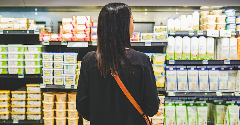
Dutch court rules against plant-based butter brand ‘Roombeter’: Only dairy products allowed to use the word ‘cream’
26 Jul 2024
A Dutch court has ruled against Upfield’s plant-based butter, Roombeter, stating that its use of the word ‘room’ (cream) in the product name violates European regulations that protect dairy-related terms allowed for dairy products only.
Read more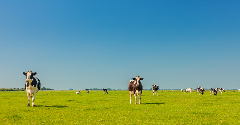
How will Denmark’s 2030 carbon tax impact farming?
12 Jul 2024
Denmark has announced plans to implement Europe’s first carbon tax on agriculture from 2030, targetting the farming sector’s CO2 emissions. How will it be implemented and how have farmers reacted?
Read more
Sweden updates front-of-pack Keyhole labelling rules
11 Jul 2024
The Swedish Food Agency has announced updates to the voluntary Keyhole logo, used in four Nordic countries, following recommendations to improve nutrition labelling.
Read more
Consumers dislike faba beans’ sensory profile
3 Jun 2024
Consumers display low acceptance of faba beans, with sensory properties such as bitterness a core concern, a study suggests. However, for product varieties such as cocoa-free chocolate, this attribute could prove to be a benefit.
Read more
Food scientists uncover new way to preserve nutrient and flavour quality
29 May 2024
Researchers have developed a method that guarantees food safety for low-moisture products, such as dried milk, while maximising quality by retaining vitamins, minerals, and flavours, they say.
Read more